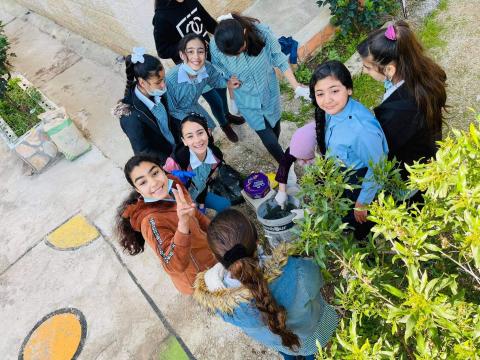Celebrating the National Environment Day

On March 5 of each year, Palestinians celebrate their National Environment Day. This year the celebration is different; the global outbreak of the coronavirus has affected every part of our lives. The measures taken to control the spread of the virus and the slowdown of economic activities have significant negative and positive impacts on our environment. The lockdown that happened due to the pandemic has improved air quality, reduced Greenhouse Gas emission and reduced water and noise pollution. On the other hand, there has been an increase in medical waste and disposal of disinfectants, mask and gloves, and the burden of untreated waste that continuously endanger the environment.
Despite all of this, the environmental club members, in the areas where World Vision JWG works, students and teachers of the 37 schools targeted by the ‘Promoting Environmental Friendly Practices and Green Schools in Palestine’ project, is keep working hard to promote protection of the environment and nature, and are celebrating Palestine’s rich nature’s diversity. The German Federal Ministry for Economic Cooperation and Development (BMZ) funds this project.
“As a member in the school environmental club, I participated in planting tress and flowers in my school garden. The project gave me a chance to develop short movies about recycling and to participate in a video making competition on recycling,” said Aisha, a member of the environmental club. Dia, another member of the club, expressed that: “The project helped me know how to start a composting program in my school. I am aware now of what type of waste can be composted at school and at home. This helped us deal with our school waste and enhance the soil and plants quality. While Nour, eighth-grade student, said: “I learned a lot from joining my school environmental club. I learned how to keep the environment safe through simple ways. My teacher has also a great role in teaching me how to take positive action to take care of our rich environment.” Moreover, Abrar, a member of one of the other school environmental clubs, said: “Taking care of our environment is our responsibility. In our environmental club, we developed intervention plans and actions to go green at our school. With the knowledge and material we received from the “Go Green” project, we did many environmental activities in our school.
The Go Green project equipped the 37 environmental club members (740 students) with the knowledge, equipment and supplies to go green at their own school and to become stewards and advocates for the environment. With the project, schools started to minimize their own environmental waste. Schools started to use technics that help protect the environment around them, such as ‘go paperless’, recycling paper to create art projects, reducing and recycling plastic and other waste, organic composting, preparing recycling centers, energy and water preservation, and starting schools gardens.